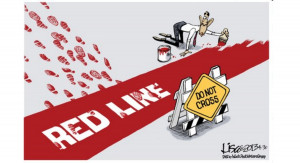I have just realized that I am a conservative, a true conservative. Each time there is a revolution somewhere in the world, I am critical of it and plainly against it. Seth Ferris is a conservative, maybe even a neoconservative. My instinct tells me it is better to maintain even unimaginably corrupt regimes than to rock the boat. Why?
Russia is now calling the bluff of the putsch in Kiev and its so-called Western supporters, whose redlines are fading quickly in Syria and Ukraine. First the US-orchestrated Orange Revolution lost its hue, now Russia has sent troops into Ukraine.
Russia is now calling the American bluff – and keeping open the option of sending substantially more troops into Ukraine, although that may not be necessary in the light of breaking news, diplomatic efforts and economic realities.
“Obama says there ‘will be consequences’ if people ‘step over the line’ in Kiev. Bashar al-Assad is doubled over in laughter,” said Denver radio talk show host Michael Brown, a former Bush administration official who resigned after his controversial handling of Hurricane Katrina in 2005.
Firstly, let’s update the “breaking news”. Russia’s Federation Council unanimously approved President Vladimir Putin’s request to use Russian military force in Ukraine on Saturday. This drastic action is designed to settle the turmoil in the split country as soon as possible. But this effectively means crossing a red line, as described in the rhetoric of the US president.
‘The Thin Red Line’ has become an English figure of speech for any outnumbered military unit holding firm against attack. The phrase has also taken on the metaphorical meaning of the barrier which the relatively limited armed forces of a country present to more powerful potential attackers. There are plenty of examples of this in Ukrainian history, and the new battle over Crimea has many historical precedents. The Battle of Balaclava on 25 October 1854, which was fought during the Crimean War, forms a good backdrop to this article.
BTW, Russia won that battle. Until 1954 Crimea was part of Russia, until Soviet leader Nikita Khrushchev, himself an ethnic Ukrainian, transferred it to Ukraine. Since the breakup of the Soviet Union, Khrushchev’s “gift” has been widely cited in the Western press, and by various pundits, as the motivation for Russia meddling in the affairs of Ukraine.
However this is a moot issue, as Russia does not need it back, as long as its naval base for the Black Sea Fleet is secure under the long-term agreement currently in place. Being Russian is a state of mind, not defined by a border. The majority (60 percent) of those living in Crimea are Russians. The US occupies a naval base in Cuba under a 99 year lease agreement, which is why it has no need to invade this ideologically different neighbor.
Crimea is where Russia has first sent troops, in response to provocations already organized by the more radical elements in Kiev as part of a desperate effort take over some government buildings. It is hoped that “sooner than later” calmer heads within the opposition will work with the legitimate government in exile and that a real solution will be found. All governments have their problems, corrupt or not. It is highly likely that the vast majority of the Ukrainian population, starting with those in the East, will eventually sort things out for the rest of the country, but at considerable cost.
Meanwhile Russia will demonstrate that it can call America’s hand anytime it wants, and especially when the safety of Russian citizens and ethnic and religious minorities, including the Jews, are at risk. But now it has no option but to draw a line in the sand within the recognized borders of Ukraine, based on legally binding agreements now in existence.
Russia troops to the rescue
One must keep in mind that Russia has concluded long-term lease agreements with the legitimate government of Ukraine which govern the basing of the Russian Black Sea Fleet there, and under these it has all legal right to beef up the security of this fleet.
Regardless of how things turn out from here, Russia’s Parliament gave its unanimous approval on Saturday for Vladimir Putin to be given the option of using Russian troops in the Ukraine, as may be necessary to protect Russian citizens and help stabilize the overall situation, and has now used them. The decision took immediate effect upon signing.
The efforts by the far right element amongst the rebel forces to occupy security buildings in Crimea was unsuccessful but shows the desperation of the new regime to use force to try to consolidate its gains and give itself some sense of legitimacy, even if it means leading the divided country to civil war.
If more than a token Russian force is deployed, outside of what is mandated by existing agreements, to provide security for its naval bases in Crimea this will be more a political maneuver, not a response to an urgent threat, to marginalize certain ultra right, neo-Nazi and anti-Semitic elements within the opposition coalition. These fringe elements, having little electoral support, are seeking to gain respect and position in the self-proclaimed new government to put into practice some of their own rabid threats. Russia may be left with no choice than to step in, on humanitarian grounds, to protect security and life.
Already slogans promising death to the Jews are being spray painted in various parts of the country, and if this is not dangerous enough the man who most wants to be in power, Aleksandr Muzychko of the Right Sector group, has publicly stated that he “will fight Jews and Russians until he dies.” One rabid minister has even suggested that Ukraine should revert to the status of a nuclear power.
As to the “consequences” on an international scale of crossing that thin red line – this discussion is irrelevant, because it’s not going to happen, not because of the ability of the US or the revolutionary government to fulfill their threats but because any “real risk” is more a matter of image, as the US does not want to be perceived as being spineless in spite of its recent track record in other parts of the world, such as Afghanistan, Iraq, and the Middle East (especially Syria).
It is true that the US might start believing its own political rhetoric, and, still smarting from not being able to profit from its less than covert involvement in Syria, may sooner or later have no choice but to try to stand up to Russia, or pass the White House into Republican hands at the next election, if it isn’t already heading that way. But does it have the troop numbers, or the genuine resolve, to do so?
Can the US can cross any “Red Line” and get away with it?

It is now clear that the US made false flag gas attacks in Syria with the help of Saudi intelligence and then got caught in the act when those involved sent emails bragging about them, as reported in a Washington Post article. Now it wants to punish Russia for not doing the same by using Ukraine for the purpose, as it has not recovered from the fallout of Russia screaming foul and counter-spinning the CNN effect with the help of the alternative press.
The US has little to offer Ukraine now except a war it can’t win, as it cannot fix Ukraine’s financial problems, with or without the help of the IMF.
The US Administration can’t even fix its own financial problems and is still living on borrowed Chinese money. Is China going to loan the US money to pay for a proxy war over Ukraine or Syria?
There are other stakeholders too who do not need a repeat of their experience of American ‘help’. Germany and Western Europe understand the importance of staying warm in the winter; Russian gas not only keeps Western Europe warm but fuels its economy.
It is clear that Merkel’s government is unwilling to foot the bill for “yet another Greece” –and the economic collapse of Ukraine will cost the EU more than the Greek bailout. Just how much is still the big question? Germany remembers how expensive the reunification of West and East Germany was, and is not able or willing to bail out Ukraine.
Or will Europe and Germany be able to withstand an OPEC-style gas embargo over support of US foreign policy or blindly support the fading image of Obama? What about the option of sanctions? We can see how well they have worked in recent history!
Red Lines vs. “Seeing Red”
Obama’s Syria ‘red line’ was echoed in his warning to Ukraine. Such “redlines and headlines” in the Western media are telling us what we know only too well. Obama’s Syria ‘red line’ in Syria was over the alleged use of gas, and made the exposure of the US staging of the gas attacks even more embarrassing. Now he is using the same language towards Ukraine. . “Hasn’t he learned his redline lesson,” as Robert Danin, a senior fellow at the Council on Foreign Relations in Washington, recently asked?
Having established chemical weapons “red line” for Syrian President Bashar al-Assad last year he failed to enforce it with military action, something critics say has undermined U.S. credibility. The ‘red’ has was really talking about was not a red line but a red herring. Nothing more than a lame threat; Russia saw that, and is now challenging the US to mean what it says or lose all its remaining credibility, not just some of it.
In another red, Red Square, The Kremlin, Russian lawmakers have unanimously “closed ranks” and called for Russia to use its armed forces as necessary to protect ethnic Russians and the country’s strategic interests – and help restore Constitutional Authority in Ukraine. Obama threatened that Russia would have to pay for any military intervention in Crimea before this decision was taken. Giving him some of his own medicine, Yury Vorobyov, the deputy head of Russia’s upper house of parliament, said on Saturday that Obama’s statement had “crossed the red line and insulted the Russian people”. He described the president’s remarks as “a direct threat” – which Obama wants Russia to think, and Russia knows he wants it to think. Okay, Mr. President, put up or shut up, and face the consequences of either.
As quoted on Voice of Russia Radio, Vorobyov urged the Federation Council to satisfy the request from President Vladimir Putin and permit the use of the Russian armed forces in Crimea. He also insisted that Russia recall its ambassador from Washington.
Much will be made of the Russian intervention in Crimea. However, it is rarely reported that all of the US’s engagements in various parts of the world in recent times have been illegal, as they violate the terms of the “War Powers Act” – the enabling legislation which stipulates Congressional Approval for foreign engagements, other than in an emergency situation for 90 days. Russia can send troops to protect its naval base under a legal agreement, but neither involvement in Ukraine nor the other conflicts of convenience the US has been so preoccupied with in recent years are legal under US law.
One thing is certain: The US Congress will refuse the current US president the legal right to cross any red line, thin, faded or otherwise. So as in Syria, lives will be lost for empty promises while the legality which could control the situation becomes the biggest casualty of all.
Seth Ferris, investigative journalist and political scientist, expert on Middle Eastern affairs, exclusively for the online magazine “New Eastern Outlook”.

